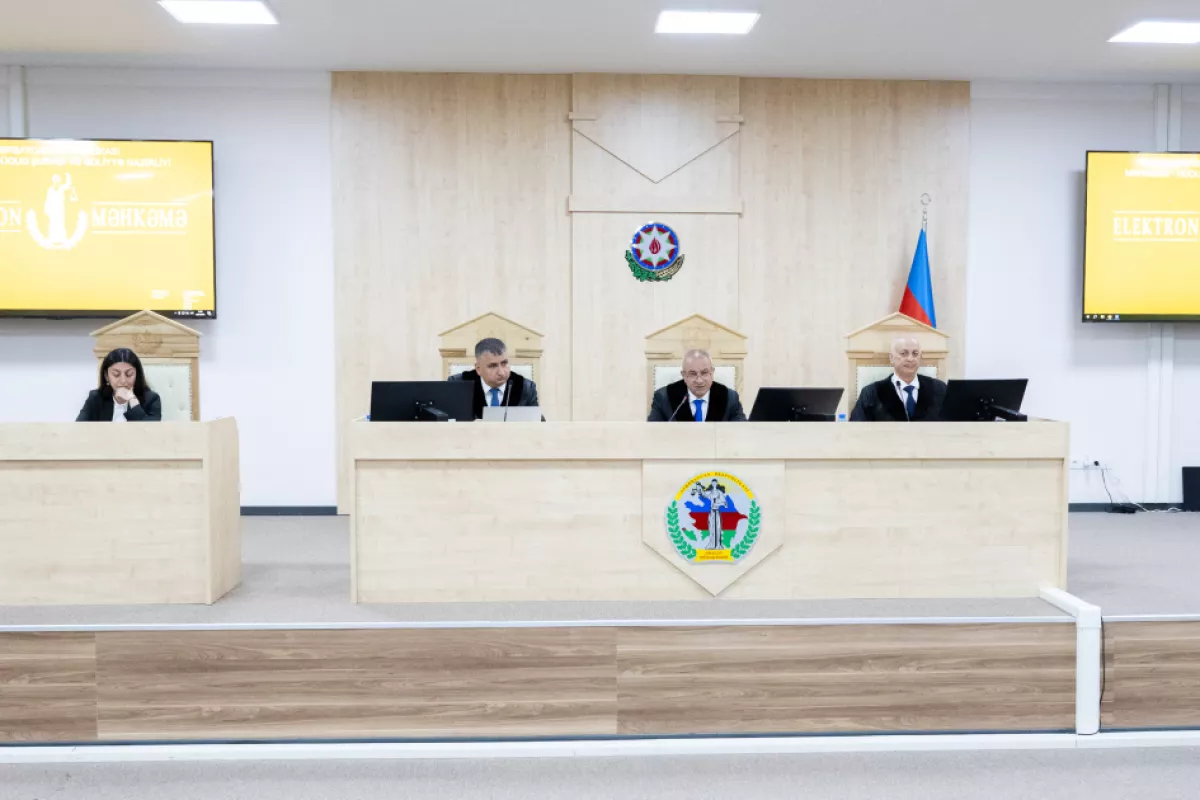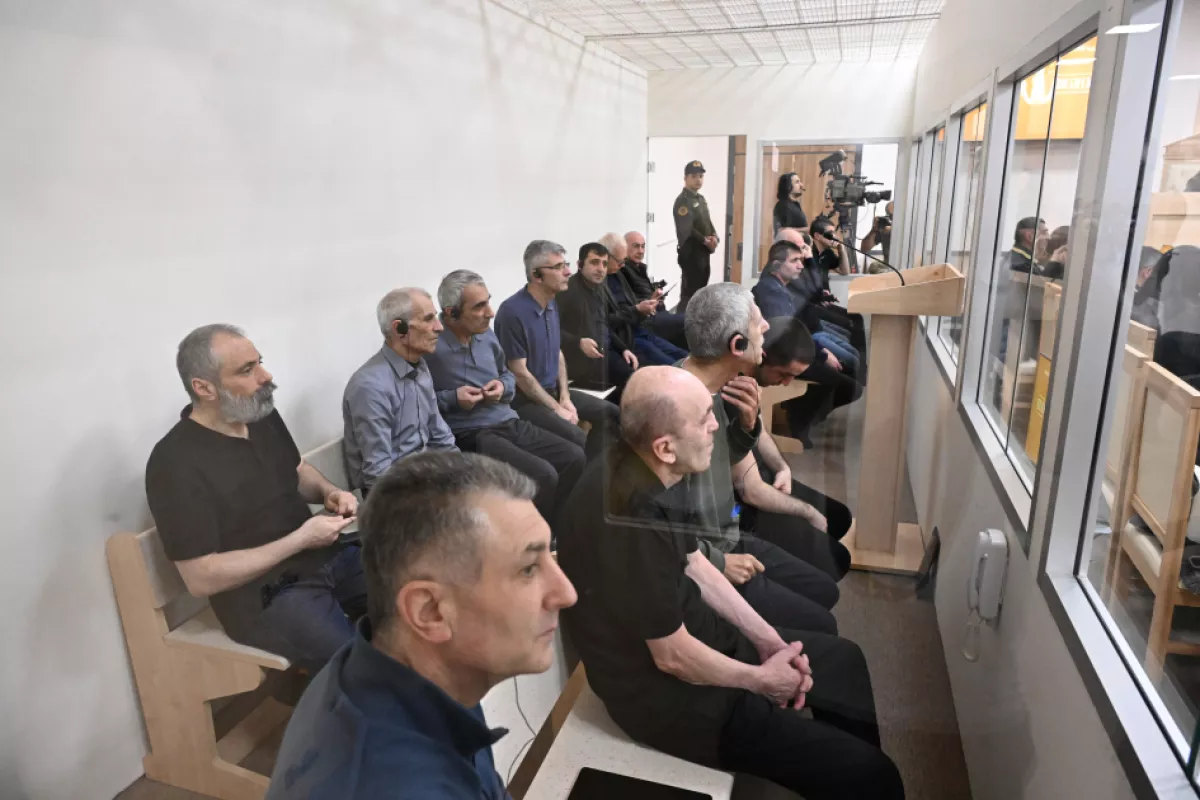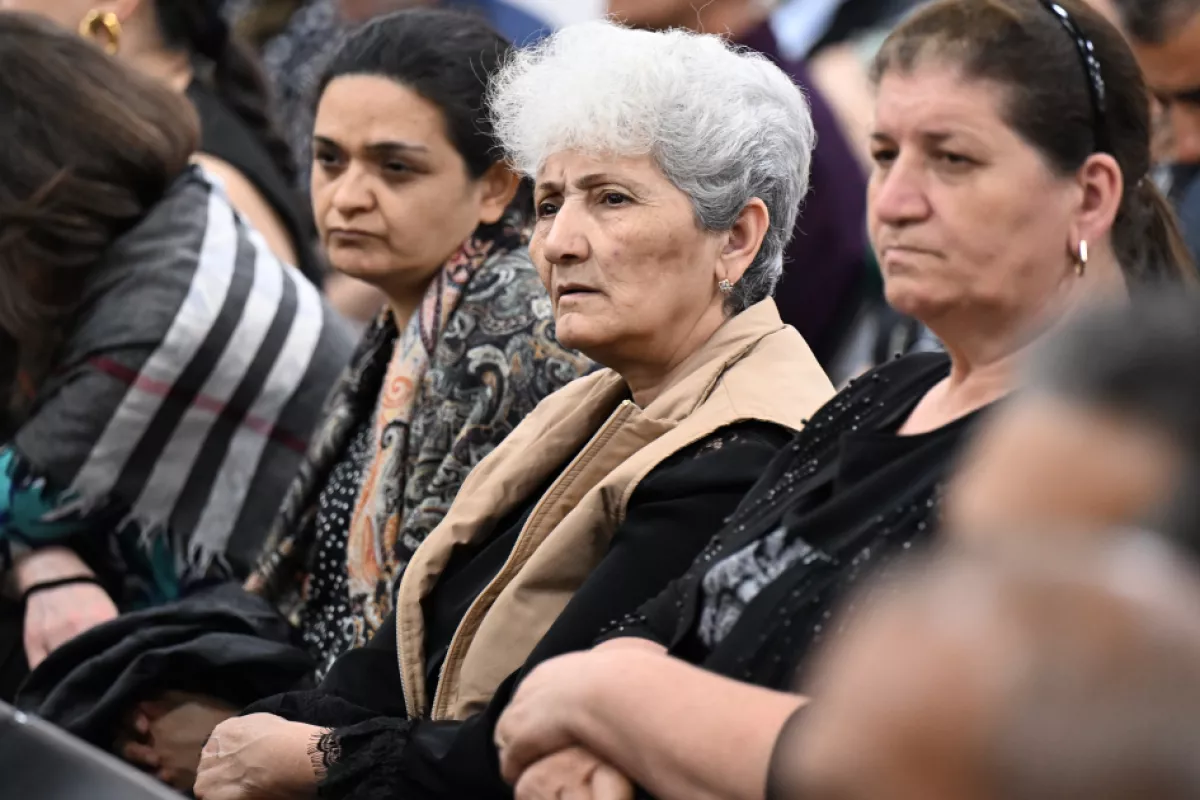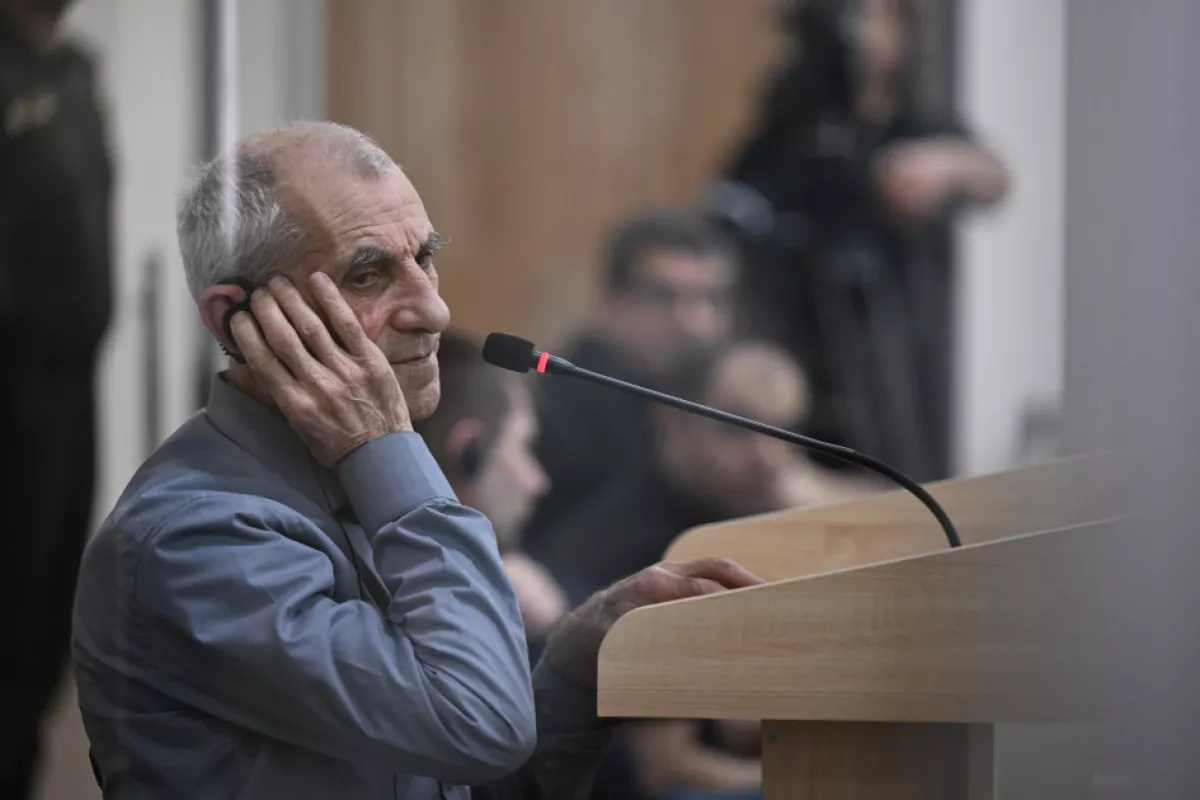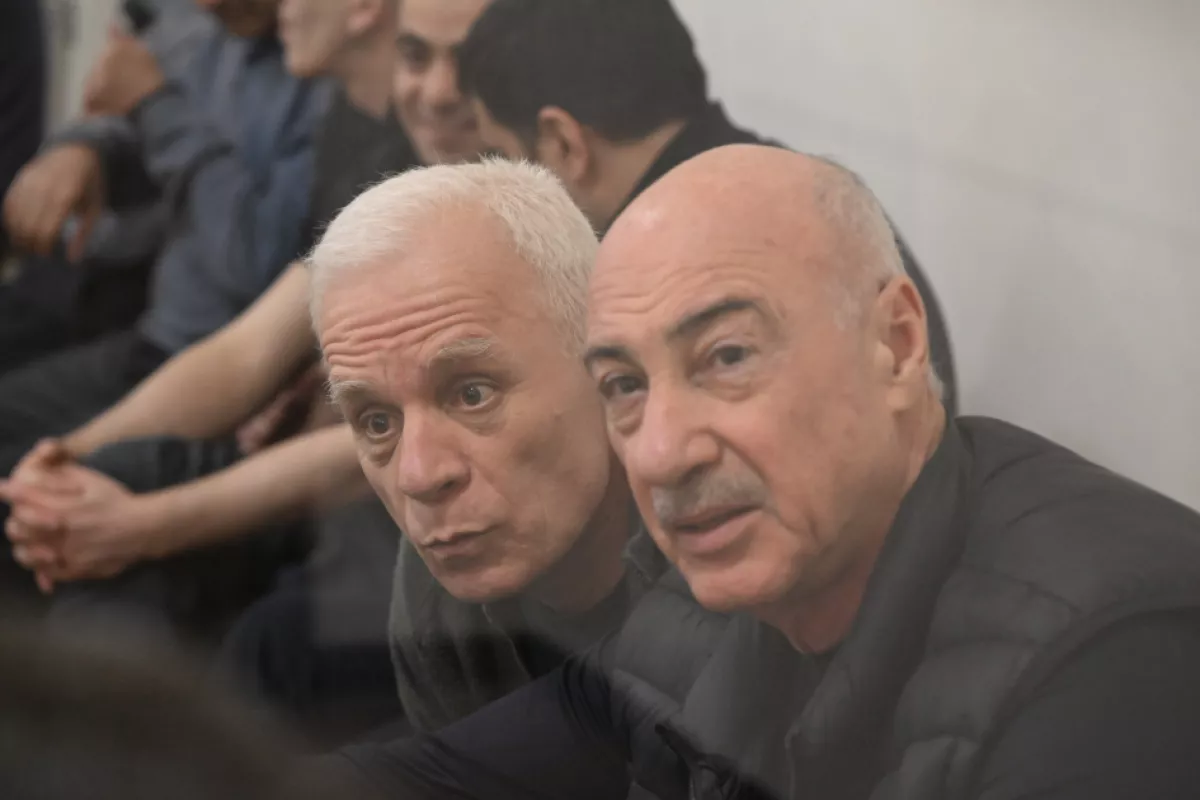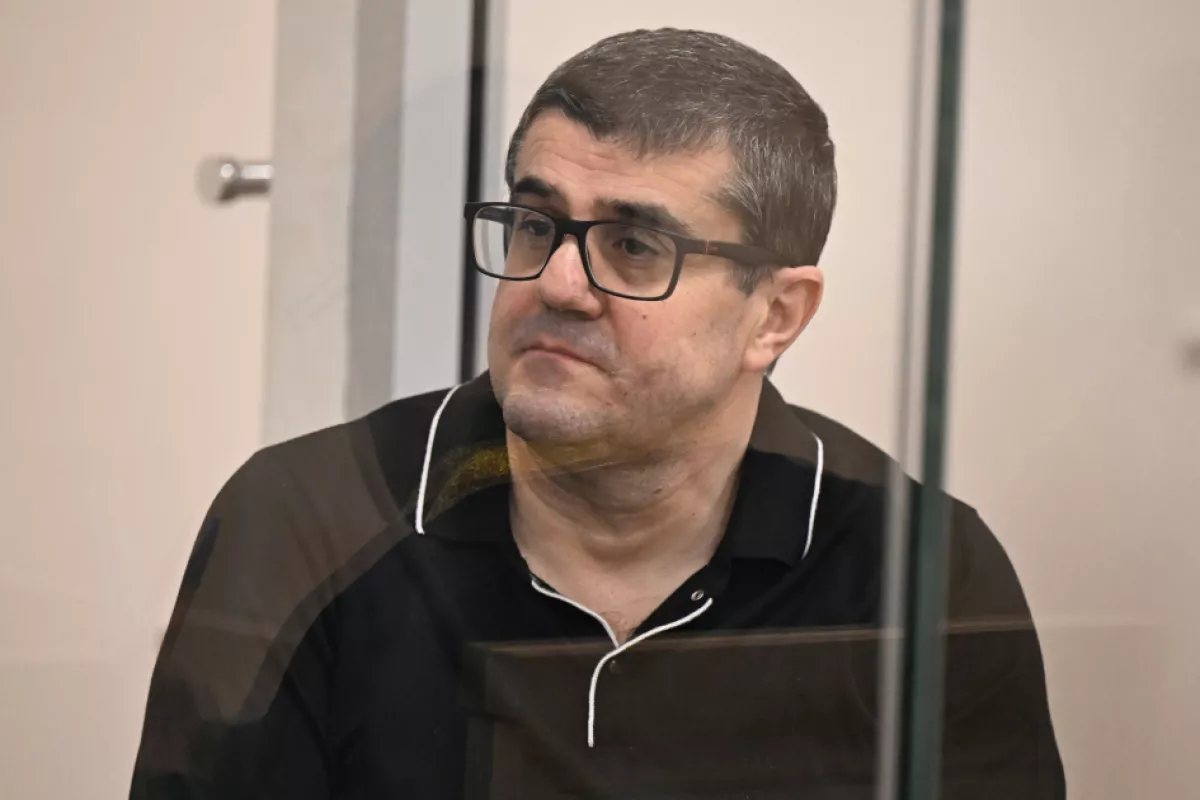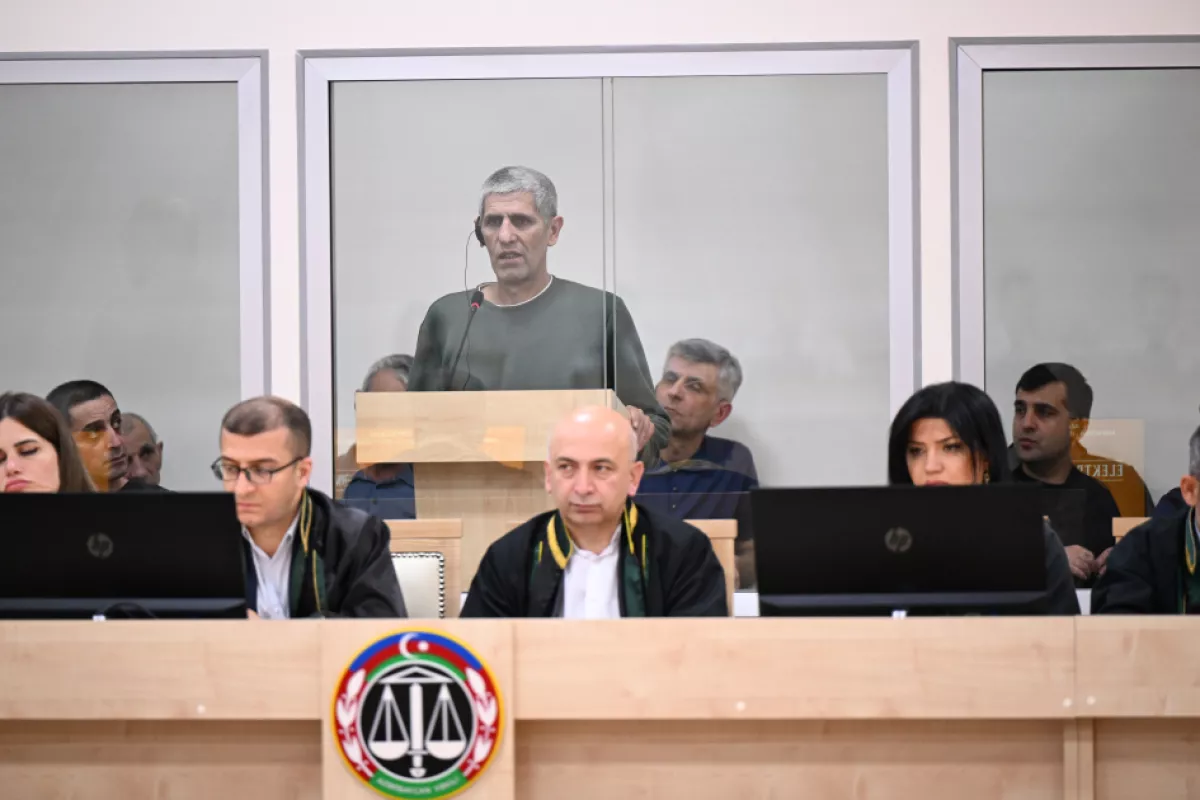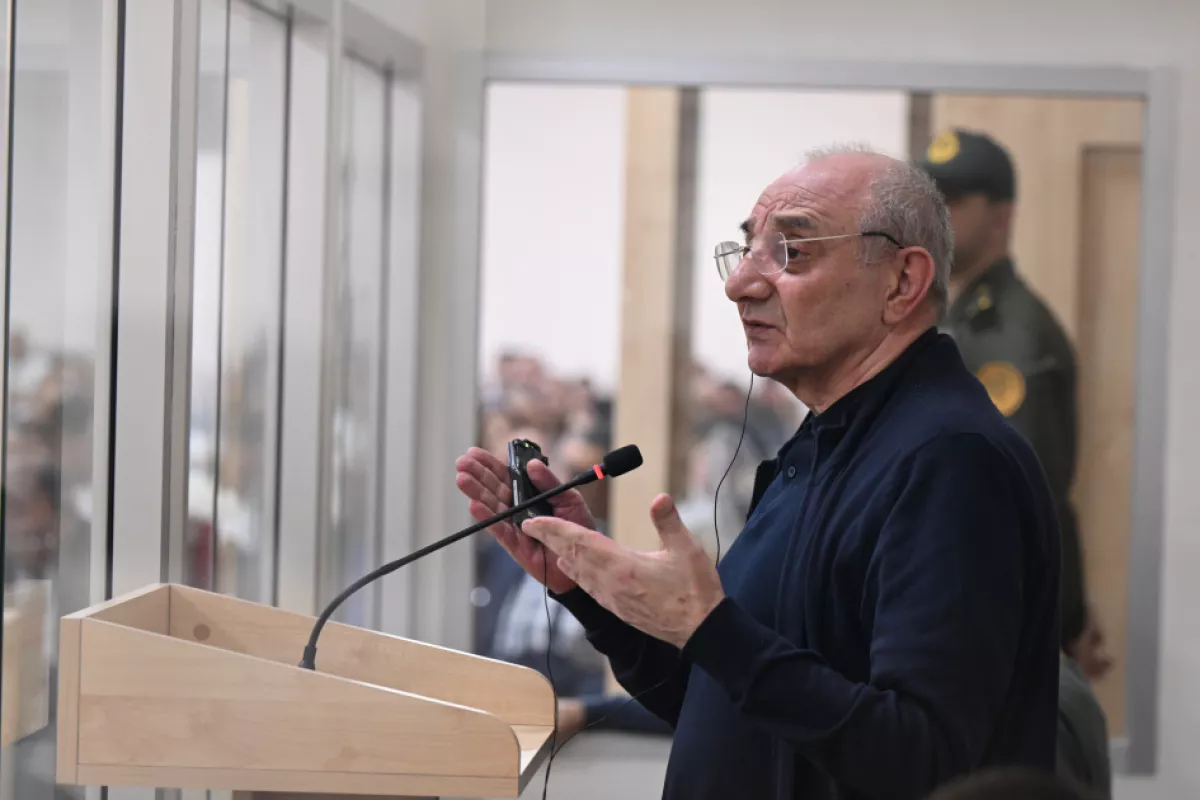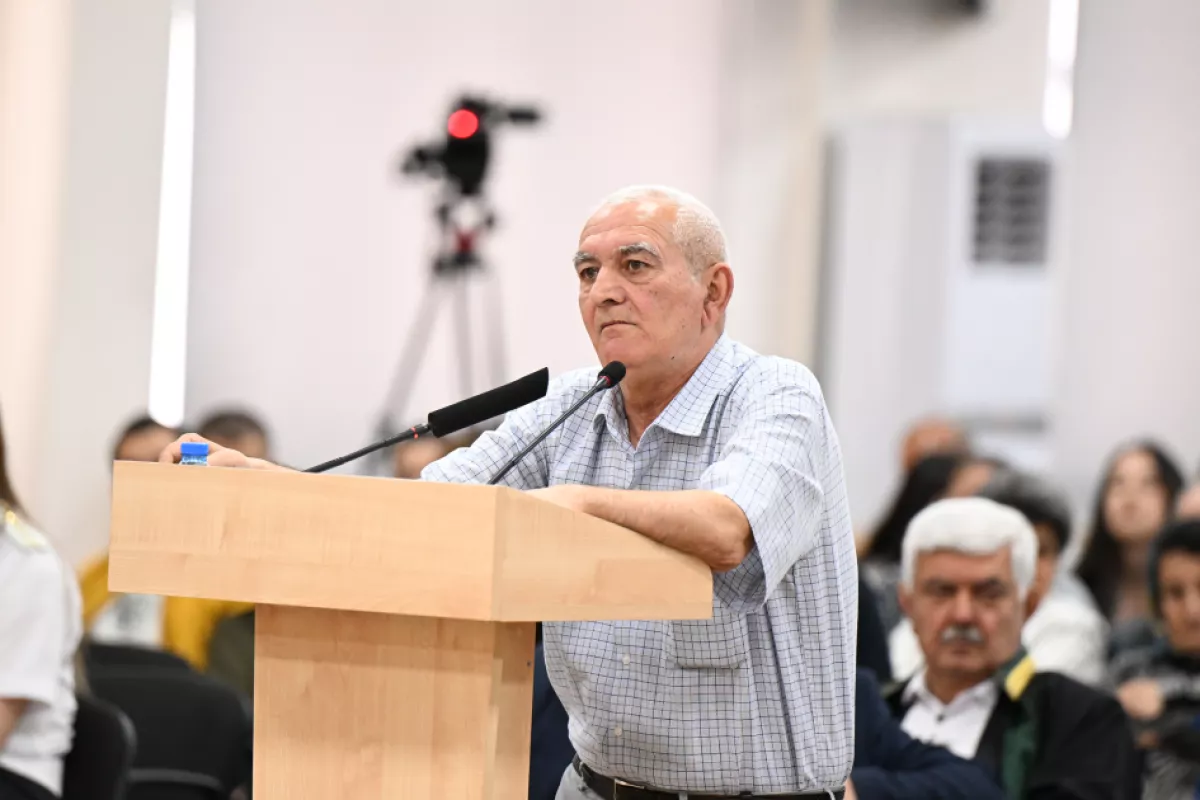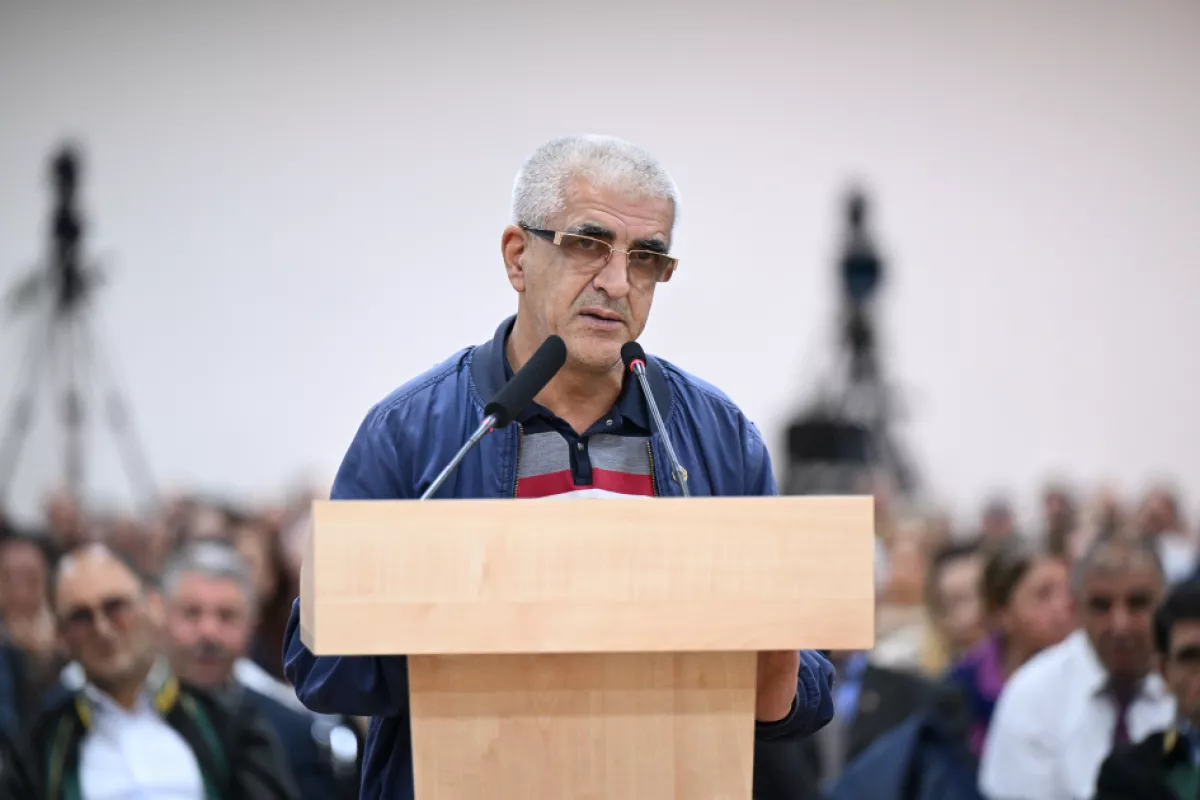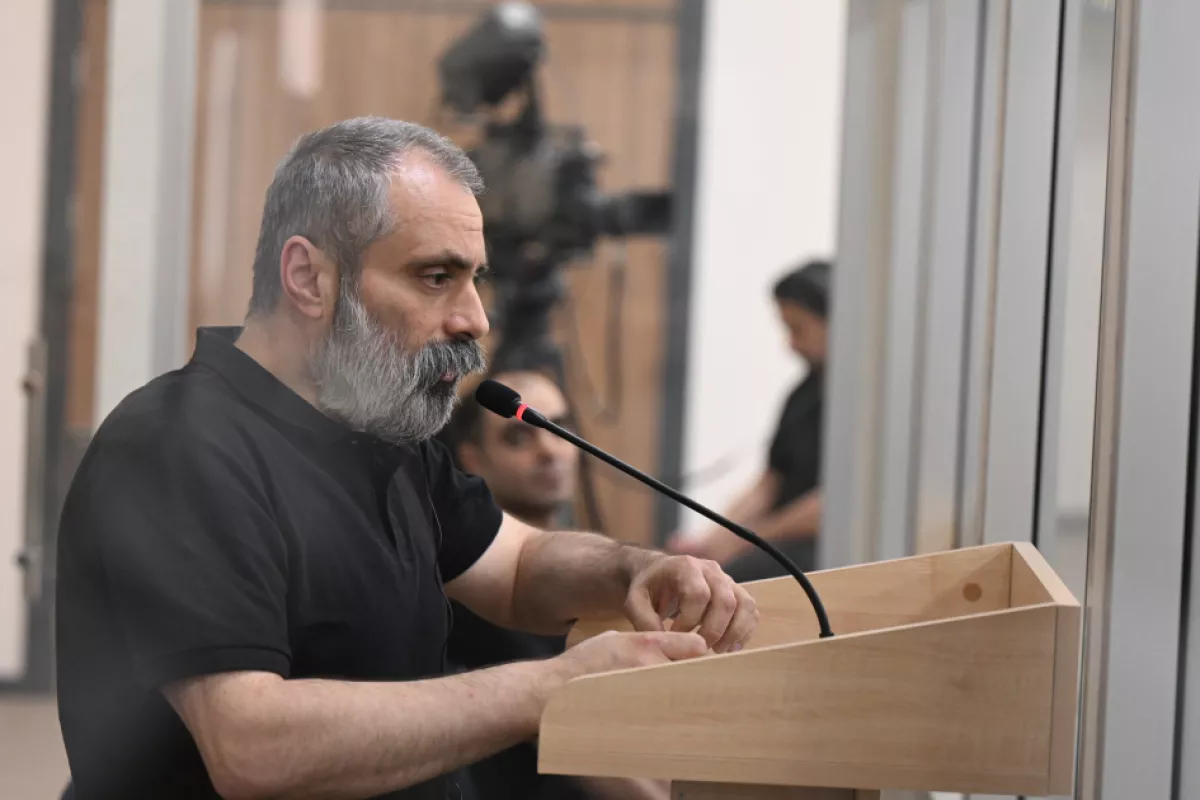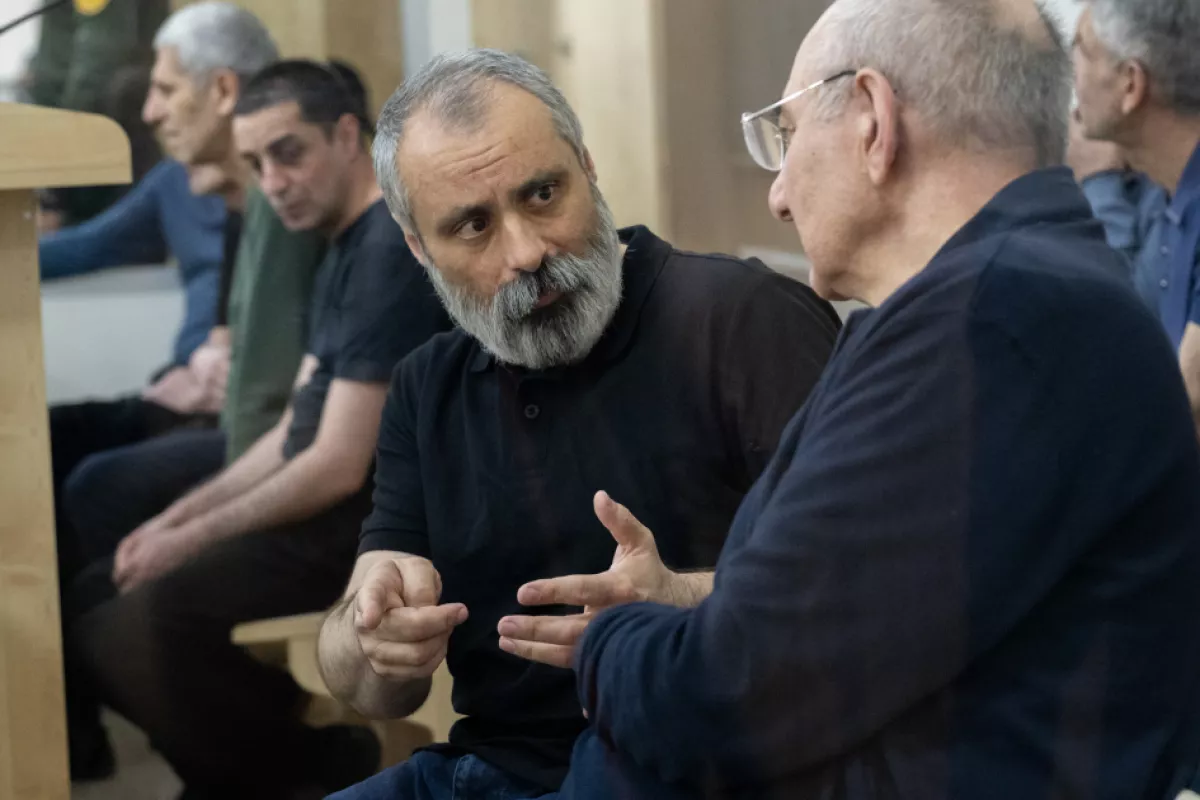Torture, killings, and war crimes: Hearings progress in Armenian defendants’ case at Baku Military Court PHOTO
On May 26, the open court hearing continued on the criminal cases against citizens of the Republic of Armenia — Arayik Harutyunyan, Arkadi Ghukasyan, Bako Sahakyan, Davit Ishkhanyan, Davit Babayan, Levon Mnatsakanyan, and others — who are accused of committing crimes against peace and humanity, war crimes, including the planning and waging of aggressive war, genocide, violations of the laws and customs of war, as well as terrorism, financing of terrorism, violent seizure or retention of power, and numerous other crimes.
Presided over by Judge Zeynal Aghayev, with Judges Jamal Ramazanov and Anar Rzayev (reserve judge Gunel Samadova), the court ensured that each defendant had legal representation and interpretation in their native language, Caliber.Az reports via local media.
The hearing was attended by the defendants, their lawyers, several victims, their legal successors and representatives, as well as prosecutors representing the state prosecution.
Judge Zeynal Aghayev introduced to the victims participating in the proceedings for the first time the composition of the court, interpreters, and other participants, and explained their rights and obligations as provided by law.
During the hearing, it was announced that a new attorney had joined the defence team of the accused Arkadi Ghukasyan. Ghukasyan stated that he had no objection to the participation of the new lawyer.
The accused, Madat Babayan, was questioned first. In response to questions from Tarana Mammadova, a prosecutor from the Department of State Prosecution in the district courts of Baku, he stated that he operated as part of an armed group in the village of Gozlukorpu, Aghdara district, and took up combat positions. However, he maintained that he did not participate in the occupation of any villages in the Aghdara district.
The accused once again confirmed in court that in February 1992 he arrived from Aghdara to Khojaly. In response to a question from state prosecutor Fuad Musayev about the reason for his arrival from Aghdara to Khojaly, he replied, "I came to support and help."
Madat Babayan confirmed that he knew individuals named Valerik Petrosyan, David Grigoryan, and Albert Grigoryan, and that he fought in the unit led by Lambert Karapetyan. He also acknowledged that these individuals were involved in the mass killing of Azerbaijani civilians in the Kalbajar district.
During the proceedings, with the assistance of an interpreter, video footage in Armenian was reviewed. The recording showed a "celebratory event" commemorating the 19th anniversary of the "liberation" of Aghdara. The video featured Bako Sahakyan, who at the time "led" the self-proclaimed regime, representatives from Armenia, and other individuals. As part of the event, former fighters who took part in the occupation of Aghdara were awarded medals and gifts.
In the video, Bako Sahakyan states: “Awarding the combat veterans here means we are honouring all former fighters. In other words, this means that every participant, whether they served in a company, platoon, or unit, is being recognised with awards.”
In response to a question from Tugay Rahimli, Assistant to the Attorney General for Special Assignments, Madat Babayan stated that the person receiving the medal in the video is not him, adding, “I don’t know who that is; it’s not me.”
The accused, Bako Sahakyan, confirmed in response to prosecutors’ questions that such an event did take place. However, he neither confirmed nor denied the awarding of a medal to Madat Babayan. Sahakyan emphasized, “I understand why you are asking this question. But at that time, I was not acquainted with Madat Babayan — I only met him here.”
The accused, Melikset Pashayan, responding to questions from Nasir Bayramov, Head of the Department of State Prosecution at the General Prosecutor’s Office, stated that he served in the 31st Battalion of the Asgaran district. He reported that, as part of the battalion, he was on combat duty during 1993–1994 in the areas of the villages Suma, Sarijali, and Gulluja in the Aghdam district. “It was an infantry battalion. The battalion was equipped with grenade launchers, mortars, machine guns, assault rifles, and grenades,” Pashayan said in response to the questions.
When asked whether he participated in looting after the occupation of Azerbaijani territories, the accused replied, “I did not take part in looting. By the time my shift at the post ended, there was nothing left to steal.”
According to the accused, it was Armenian civilians who engaged in looting. He stated that the military personnel warned these civilians not to enter the area, saying, “Don’t go there — you could get caught in gunfire or shelling.”
Pashayan also added that the reason the soldiers tried to dissuade civilians from looting was to protect them physically.
The accused stated that for his participation in the First Karabakh War, he was awarded the so-called “medal” “For Courage" by the self-proclaimed regime, adding, "I don't remember exactly; it was either under Bako Sahakyan or Arayik Harutyunyan."
Next, the accused Garik Martirosyan, who served in the same battalion as M. Pashayan, was questioned. Responding to questions from Fuad Musayev, prosecutor in the Department for Supporting State Prosecution in Courts for Serious Crimes at the General Prosecutor’s Office, he stated that he had participated in the war since 1993: “I was part of the Askeran Defense District, commanded by Vitaly Balasanyan.”
He also reported that the battalion he served in was stationed in Aghdam, and added: "At first, the battalion was located in the village of Aghbulag in the Asgaran district. After the capture of Aghdam, the battalion was deployed in that area. The battalion commander was Vilen Safaryan, the platoon commander was Armen. I don't remember the name of the company commander."
The accused also stated that some of the servicemen from the 31st battalion, which he served in, participated in the occupation of Aghdam; however, he himself claimed that he did not take part in the occupation and explained: “We were on duty at posts to defend the occupied territories.”
Garik Martirosyan confirmed that he was awarded the medal “For Courage”: “It was either by the order of Arkadi Ghukasyan or Bako Sahakyan.”
After the recess, the court session resumed with the examination of evidence regarding the episode of "Enforced disappearances of people, torture of prisoners and hostages."
Senior Assistant to the Prosecutor General Vusal Aliyev reported that graves were found in the territories liberated from occupation. Investigative authorities conducted inspections of these burial sites. The corresponding inspection protocols were examined during the trial.
It was noted that after the liberation of Azerbaijan’s sovereign territories, numerous mass graves containing human remains were discovered during the ongoing work. These sites were inspected by the investigative authorities.
It was also emphasised that some of the individuals taken prisoner or held hostage were deliberately killed at detention sites through the use of torture and inhumane treatment. It was further reported that a significant number of prisoners and hostages were released thanks to measures taken by the Azerbaijani state and international organisations, as well as through the personal initiative and connections of their close relatives—in exchange for monetary payments.
Then, as part of the mentioned episode, testimony was given by the victim Zahid Hasanov. He reported that on March 7, 1994, he was wounded in the village of Ashagy Seyidahmedli in the Fizuli district and remained there until March 8. “On March 8, Armenians entered this village and took us — four wounded men — prisoner. Despite our wounded condition, we were subjected to torture while being transported in a KamAZ truck, and later in the hospital.”
“We were held in Children’s Hospital No. 3 in Khankendi. Along with us were other prisoners and hostages, including women and children. The International Committee of the Red Cross (ICRC) did not provide us with any assistance. The Committee had a representative named Mark, and the nurse was called Veronika. I stayed there for about a month and a half. During that entire time, Mark came only twice. He did not examine our wounds or do anything. Then we were transferred to the Shusha prison — Mark never came there at all,” Zahid Hasanov reported.
He also said that during their detention in the hospital in Khankendi, schoolchildren visited them along with their teachers: “They showed us to the children and said, ‘Look, these are Turks, your enemies.’ The children spat at us and threw stones.”
The victim noted that he did not receive medical treatment in Khankendi and added that during that period, Armenian soldiers and guards named Samvel, Vrezh, Junior and Senior Borya, Karen, Armen, and Serzhik—who used alcohol and narcotics—regularly beat him severely on his wounded body parts, delivering numerous blows with fists, feet, metal batons, and rifle butts, subjecting him to various forms of torture. The same severe torture was inflicted on other Azerbaijani prisoners of war held with him in the hospital: Ilham Salmanoglu Gurbanov, Nazim, Panah Isgandarov, Shahbaz, Igor Aliyev, Khasay, Eldar Israiloglu Abdullayev, Tarlan, Sevil, as well as other prisoners whose names he could not remember.
On April 28, 1994, he was transferred to Shusha prison along with Khasay, Panah Iskenderov, Igor Aliyev, and Myurshyud Mestaliyev. There, Armenian guards named Emin, Karen, Gor, Vren, Albert, Sergey, as well as others whose names he did not know, subjected him to brutal beatings with wooden batons, rebar, and other blunt objects. He was held in cold cells without food or water and was forced to perform hard and dirty labour. On May 1, 1994, Karen placed him in a solitary cell, poured a bucket of cold water over him, and beat him with a wooden stick until he lost consciousness.
On May 8, 1994, he was transferred along with Azer Aslanov and Murshud Mestaliyev to a detention facility located in a three-story building in the city of Khankendi. He was daily forced to do hard labour in the fourth battalion, which was situated near the Khankendi military hospital, commanded by Karen Babayan.
The victim stated that during his captivity he saw one of the accused—Bako Saakyan—in the battalion whose commander personally met him.
The accused, Bako Saakyan, in turn, noted that from the end of 1992 and for the next 30 years, due to his official duties, he had contact with prisoners of war and hostages: “I maintained communication with international organizations, including the International Committee of the Red Cross (ICRC).”
However, when asked a clarifying question by state prosecutor Vusal Abdullayev, B. Saakyan refused to answer.
The victim, Zaur Gulmammadov, reported that in February 1993, he was shot in the abdomen during battles on the Nargiztapa height in the Khojavand district and said: “I lost consciousness from the wound, and when I came to, I realised I was in a different place. Later, it turned out to be the ‘Tek Chinar’ area in the Khojavand district. As soon as I opened my eyes and tried to ask about my comrades, I was hit with a rifle butt. First, they took me to a ‘prison’ in Khojavand, then to a hospital where I underwent surgery to remove the bullet. After that, I was returned to the ‘prison’ and later transferred to Girmizibazar. There, they beat us with rebar and rifle butts. We were fed only grass and drank melted water. After three months, on the anniversary of Andranik, they came with the intention to behead us. An ICRC representative arrived. The Armenians told him that there was not a single wounded Azerbaijani serviceman there. They tried to deceive the ICRC in order to kill us.”
“We were held in a place where there was not a single doctor. We had long hair and beards, and our bodies were covered with lice and fleas. We were not allowed to wash our hands. There was a prisoner named Gabil from Aghdam with us. Because he was from Aghdam, they beat him to death. After brutally beating Gabil, they threw his body on us. There wasn’t a single intact spot on his body. He died that same day. They broke my left leg three times. Then we were transferred to Shusha. The torture started all over again. They set a German shepherd on us — I still have bite marks on my arm,” (showing his arm) “A guy named Tatar from Aghdam was kept in a freezer for a week and was frozen to death,” said Zaur Gulmammadov.
He reported that he was held captive for nine months and was handed over to Azerbaijan as part of a prisoner exchange: “Now I have a prosthesis on my left side.”
The victim, Asgar Asgarov, stated that he was born in the village of Khinalyg in the Guba district and participated in battles in the directions of Kalbajar, Aghdara, and Lachin. On April 2, 1993, he was captured by Armenian soldiers. According to him, he was tied to an armoured personnel carrier and dragged through the centre of Kalbajar city, brutally beaten, tied to a post in the evenings, and subjected to other forms of torture.
Later, he and other young prisoners were temporarily held in a detention facility of the Basarkechar District Internal Affairs Department in Armenia. Afterwards, they were transferred to a building used as the military police guardhouse in the city of Yerevan. In all these places, he was brutally beaten with fists, feet, and rubber batons and subjected to torture. On January 15, 1995, he was released in an area bordering the Kazakh District and handed over to the Azerbaijani side along with Bakhtiyar Tagiev.
The victim, Elchin Jafarov, reported that in May 1993 he was drafted into military service from the Narimanov district and began his service at a military unit located in the Nakhchivan Autonomous Republic. In June 1995, he was captured by Armenian soldiers. He was held for 4-5 hours in the Karakilis district, then transported to Yerevan in a Niva vehicle. There, he was taken to the Armenian Ministry of Defense and later to a temporary detention facility. He stayed there for 23 days and was subjected to torture. Afterwards, he was transferred to the detention center of the Armenian State Security Committee, where he was held until May 1996. Other Azerbaijani prisoners were also held in the detention center.
During his time in the detention center, he was subjected to multiple tortures: forced to work without rest, beaten with iron objects, and his body was burned with heated iron pieces.
The Armenians tried to persuade them to side with them, and in case of refusal, they were brutally beaten. On May 10, 1996, he was released from captivity and, along with 67 Azerbaijanis held in various locations, was transported to Baku from Yerevan airport.
During the court session, the defendants also answered questions from the defense and representatives of the victims.
Additionally, forensic medical examination reports related to the victims were presented during the trial.
The court proceedings will continue on May 29.
A total of 15 Armenian nationals are being charged with numerous crimes involving direct leadership and participation of the Armenian state, its state bodies, military forces and illegal armed formations, verbal and written instructions, orders and assignments, provision of material and technical support, central governance, as well as the exercise of rigorous control, with the aim of committing military aggression and acts of terror against the Republic of Azerbaijan in the territory of Azerbaijan in violation of domestic and international law, and involving Robert Sedraki Kocharyan, Serzh Azati Sargsyan, Vazgen Mikaeli Manukyan, Vazgen Zaveni Sargsyan, Samvel Andraniki Babayan, Vitali Mikaeli Balasanyan, Zori Hayki Balayan, Seyran Mushegi Ohanyan, Arshavir Surenovich Garamyan, Monte Charles Melkonian and others, including criminal acts committed during the course of the war of aggression waged by the aforementioned criminal group.
The individuals listed—Arayik Vladimiri Harutyunyan, Arkadi Arshaviri Ghukasyan, Bako Sahaki Sahakyan, Davit Rubeni Ishkhanyan, David Azatini Manukyan, Davit Klimi Babayan, Levon Henrikovich Mnatsakanyan, Vasili Ivani Beglaryan, Erik Roberti Ghazaryan, Davit Nelsoni Allahverdiyan, Gurgen Homeri Stepanyan, Levon Romiki Balayan, Madat Arakelovich Babayan, Garik Grigori Martirosyan, Melikset Vladimiri Pashayan—are charged with a range of crimes including planning and waging war of aggression, genocide, extermination, enslavement, deportation, persecution, enforced disappearance, unlawful detention, torture, mercenary service, violations of warfare laws and international humanitarian law, military robbery, intentional murder, illegal entrepreneurship, terrorism, financing terrorism, creating criminal organizations, illegal possession and trafficking of weapons, threatening aviation security, assassination of state officials, forcible seizure of power, and the creation of illegal armed groups, among others under the Criminal Code of the Republic of Azerbaijan.
By Khagan Isayev




